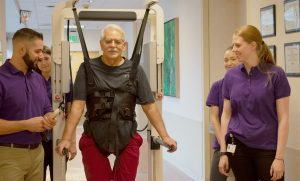" Gap and also regression adhering to inpatient treatment of opiate dependence." Irish Medical Journal, June 2010. Nevertheless, relapses are opportunities to develop a more powerful foundation for the future. Phone call The Recovery Town today to talk through therapy choices with a representative if you've experienced a setback and also want to go back to therapy.
What happens when you get out of rehab?
Rehabilitation is care that can help you get back, keep, or improve abilities that you need for daily life. These abilities may be physical, mental, and/or cognitive (thinking and learning). You may have lost them because of a disease or injury, or as a side effect from a medical treatment.

Mornings: A Healthy And Balanced Breakfast And Early Conferences
There are several physical and behavior relapse warning signs. Becoming aware of the signs of relapse can discourage somebody from making use of materials again.
Whether you seek aid voluntarily or you are forced by circumstances to get in rehab, your healing process will start with a professional treatment program. Click on this link for Often Asked Questions regarding household medicine and/or alcohol rehab.

A range of aspects affect the addictiveness of a material, such as the level of tolerance a person creates after duplicated usage and the strength of the medication's withdrawal symptoms. An individual will in some cases embark on a 6-to-12-month recovery program in a committed facility. Following this, they might reside in supervised housing while they adjust to locating as well as taking care of funds work. Individuals in therapy programs must also get screening for infectious conditions that could have arised from specific high-risk scenarios related to their habit forming problems such as Consumption, liver disease, and hiv. Treatment could happen on a one-to-one, group, or household basis depending upon the requirements of the individual.
- In the 1900s, Anna Freud as well as her peers were part of the Vienna Psychoanalytic Society and they worked with just how to take care of kids.
- Thinking a 28- or 60-day therapy program can deal with all your issues greatly underestimates the intensity of what you're going through.
- They worked to create household treatment facilities for children as well as teenagers with psychological as well as behavior problems.
Can you go to rehab for anxiety and depression?
After completing detoxification and inpatient rehabilitation, a recovering addict will return to normal life. This includes work, family, friends and hobbies. All these circles and events can trigger cravings and temptations. Research suggests most relapses occur in the first https://blogfreely.net/yenianmrr9/with-this-in-mind-if-you-wish-to-stay-clear-of-the-wait-get-there-early-at six months after treatment.
They might additionally think that what is Rehabilitation Center occurring to them is in some way their mistake, or that there are no therapy options offered. In untreated or extreme situations, especially when associated with mental health problems connected with psychosis, signs and symptoms may additionally consist of hallucinations, fear, delusions, and absence of insight. So, the signs and symptoms of what some individuals might still call an anxious breakdown depend upon the hidden clinical condition.
Which drug has the highest rate of relapse?
Dual diagnosis rehab focuses on treating your depression Alcohol Abuse Treatment and your substance abuse as separate but closely related issues. In addition to medical detox, you may receive psychotherapy that targets your depression or anxiety. For those who struggle with depression and addiction, recovery can be twice as challenging.
Regardless of what kind of rehabilitation you pick, it can assist place you on a path to long-lasting recovery. People live in supervised, momentary real estate where they can join treatment programs.
Why do we need rehabilitation?
A residential treatment center (RTC), sometimes called a rehab, is a live-in health care facility providing therapy for substance abuse, mental illness, or other behavioral problems. Residential treatment may be considered the "last-ditch" approach to treating abnormal psychology or psychopathology.